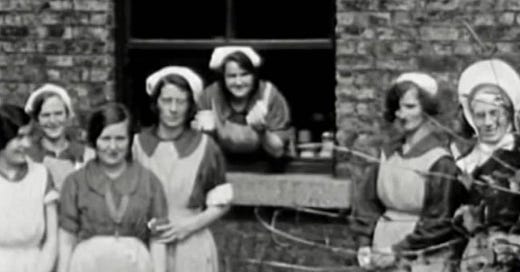'We put away these women because for too many years we put away our conscience'
It's eleven years today since the then Taoiseach of Ireland Enda Kenny delivered an apology to survivors of the Magdalene Laundries.
The Magdalen Laundries, sometimes called the Magdalen Asylums, were institutions predominantly run by Catholic religious orders to house and detain ‘fallen women’. Most of the orders themselves deny that women were unlawfully detained or treated as slaves, but there are numerous testimonies to say that this did occur. The 10 Laundries on the Republic of Ireland were paid for their servicces, but the women who worked in them were not. Sex workers and prostitutes were targeted to be taken away to the laundries, but as the institutions expanded, and became factories of free labour, a ‘fallen woman’ could be anyone assessed to be of low moral standing, with judgments around promiscuity, unmarried mothers, learning difficulties, homelessness, mental illness, victims of abuse or even just girls whose mothers were in the Laundries.
In 1993, unmarked graves of 155 women who’d worked at a particular laundry were uncovered in the grounds. There was national outcry, and the country began to hear the stories of the 30,000 women who were confined in Magdalen Laundries from the mid eighteenth century until the end of the twentieth. 10,000 of these women were confined after Ireland achieved a form of independence in 1922.
There was a report commissioned into the treatment of the Magdalen women that published in February 2013 that said there was ‘significant’ state collusion into the admission of thousands of women into these institutions. Two weeks later, the president (Taoiseach) stood up in the parliament (Dáil) and issued an apology. A compensation scheme was also set up to support Magdalen Laundry survivors.
Enda Kenny: 'We put away these women because .for too many years we put away our conscience', Apology to Magdalene Laundries women - 2013
This is from the middle of the speech
In the laundries themselves some women spent weeks others months more of them years. But the thread that ran through their many stories was a palpable sense of suffocation not just physical in that they were incarcerated but psychological .spiritual social. Their stories were enriched by an astonishing vividness of recall of situation and circumstance.
Here are some of the things I read in the report and they said directly to me:
“The work was so hard, the regime was cruel.”
“I felt all alone, nobody wanted me.”
“They sent me because they thought I was going to a good school.”
“I seen these older people beside me, I used cry myself to sleep.”
“I was bold, I wasn’t going to school.”
“I was locked up I thought I would never get out.”
“We had to sew at night even when we were sick.”
“I heard a radio sometimes in the distance.”
“We were not allowed to talk to each other.”
“Your letters were checked.”
“I was so short I needed a stool to put washing in.”
“The noise was desperate.”
“I thought I would go mad from the silence.”
“The heat was unbelievable.”
“I broke a cup once and had to wear it hanging around my neck for three days.”
“I felt always tired always wet .always humiliated.”
“My father came for me after three months but I was too ashamed to go home.”
“I never saw my Mam again she died while I was in there.”
The Magdalene Women might have been told that they were washing away a wrong or a sin but we know now and to our shame they were only ever scrubbing away our nation’s shadow.
This is how the Taoiseach concluded:
Let me conclude by again speaking directly to the women whose experiences in Magdalene Laundries have negatively affected their subsequent lives.
As a society, for many years we failed you.
We forgot you or, if we thought of you at all, we did so in untrue and offensive stereotypes.
This is a national shame, for which I again say, I am deeply sorry and offer my full and heartfelt apologies.
At the conclusion of my discussions with one group of the Magdalene Women one of those present sang ‘Whispering Hope’. A line from that song stays in my mind – “when the dark midnight is over, watch for the breaking of day”.
Let me hope that this day and this debate – excuse me – heralds a new dawn for all those who feared that the dark midnight might never end.
You can get the full speech on Speakola, or upgrade to paid and read it below.
I’d love it if you’d listen to an episode of the Speakola podcast. This episode, in which a grief coach talks about her eulogy (and love) for her husband, is a personal favourite.
Keep reading with a 7-day free trial
Subscribe to Speakola newsletter to keep reading this post and get 7 days of free access to the full post archives.





